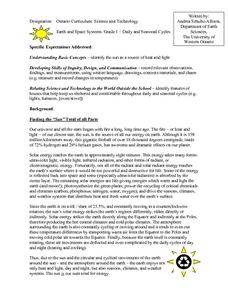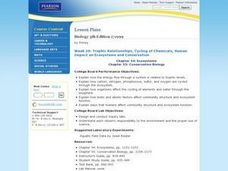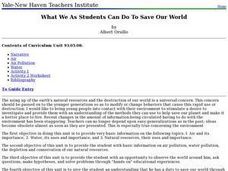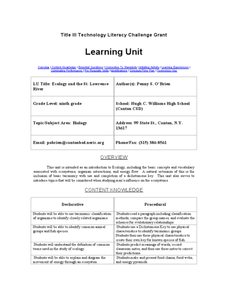Curated OER
The Marvels of Mud
Young scientists roll up their sleeves and get a little dirty in this three-day earth science investigation. Following the scientific method, children monitor the growth of algae in pond water samples in order to determine the role that...
Curated OER
Daily and Seasonal Cycles
First graders identify the sun as a source of heat and light. They identify features of houses that help keep use sheltered and comfortable throughout daily and seasonal cycles. Students are told that summer is the best season to...
Curated OER
Ecology
Sixth graders identify the steps of the different cycles of matter, while learning to use WP utilities.
Curated OER
Trophic Relationships, Cycling of Chemicals, Human Impact on Ecosystems and Conservation
Learners explore how the energy flow through a system is related to trophic levels. They investigate how organisms affect the cycling of elements and water through the biosphere. Students participate in lab activities to observe ways...
Curated OER
What We As Students Can Do To Save Our World
Learners investigate air and water pollution, and the conservation of natural resources.
Curated OER
The "Coal LIfecycle" Scrapbook
Students discover how coal is formed. In this science lesson plan, students create a scrapbook on the life cycle of coal and show how coal is formed by showing pictures of each stage.
Curated OER
Physical and Chemical Changes
Sixth graders complete several experiments about chemical and physical changes. In this physical and chemical science lesson, 6th graders complete 6 experiments about chemical and physical changes. Students examine the processes of...
Curated OER
Microbes in Long Island Sound
Students discover the harm and benefits of microbes. In this biology lesson, students explore water, nitrogen and carbon cycles. They investigate the factors affecting bacteria growth.
Curated OER
Recyclers Revisited
Fifth graders observe their plant experiments that they started in a previous lesson and examine the role of decomposers in the nitrogen cycle. Two weeks after they set up a worm terrarium, they analyze any changes they observe, and...
Curated OER
Ions in the Environment
Students explain the importance of the five main biogeochemical cycles. In this chemistry lesson plan, students discuss how ions are transported in the environment. They design an experiment to collect data on eutrophication.
Curated OER
Solid Waste Recycling
Students seek scientific and technological solutions to envrionmental problems. They record class activities in a journal. They identify relationships among living things and their environments.
Virginia Department of Education
Go with the Flow
How does nature's hierarchy relate to our local human environment? Answer this question, along with others, as the class visually depicts the natural hierarchy provided by nature. Pupils discuss each piece of the pyramid and its energy...
Curated OER
Structure of the Earth
Sixth graders define atmosphere and hydrosphere, explore through experimentation how the atmosphere was formed, and describe the layers of the Earth's atmosphere and their distances.
Curated OER
Go With the Energy Flow
Students explore energy and nutrient flow. In this science lesson, students diagram the flow of energy through food chains and food webs. Students discuss the importance of energy flow in Earth's ecosystems.
Curated OER
Biological Sciences
Students examine biodiversity and interrelatedness concepts. In this ecology lesson students go on a field trip and fill out a data sheet.
Curated OER
Spring Awakenings
Young scholars observe changes in a selected tree bud/leaf during spring. They record changes in the bud/leaf using words, pictures and numbers. They understand that trees adapt to changes in temperature, light, and moisture by sprouting...
Curated OER
Fossil Fuels, Who Needs Them
Ninth graders explore how electricity is created and distributed through alternative production methods. Students participate in hands-on activities, research, lecture based instruction, and CD ROM resources.
Curated OER
Ecology and the St. Lawrence River
Ninth graders complete a unit of lessons on ecosystems, organism interactions, and energy flow. They create a key for known species of fish, diagram the movement of energy through an ecosystem, and create and present food chains and food...
TeachEngineering
Teach Engineering: Go With the Energy Flow
Students learn about energy and nutrient flow in various biosphere climates and environments. They learn about herbivores, carnivores, omnivores, food chains and food webs, seeing the interdependence between producers, consumers and...




















